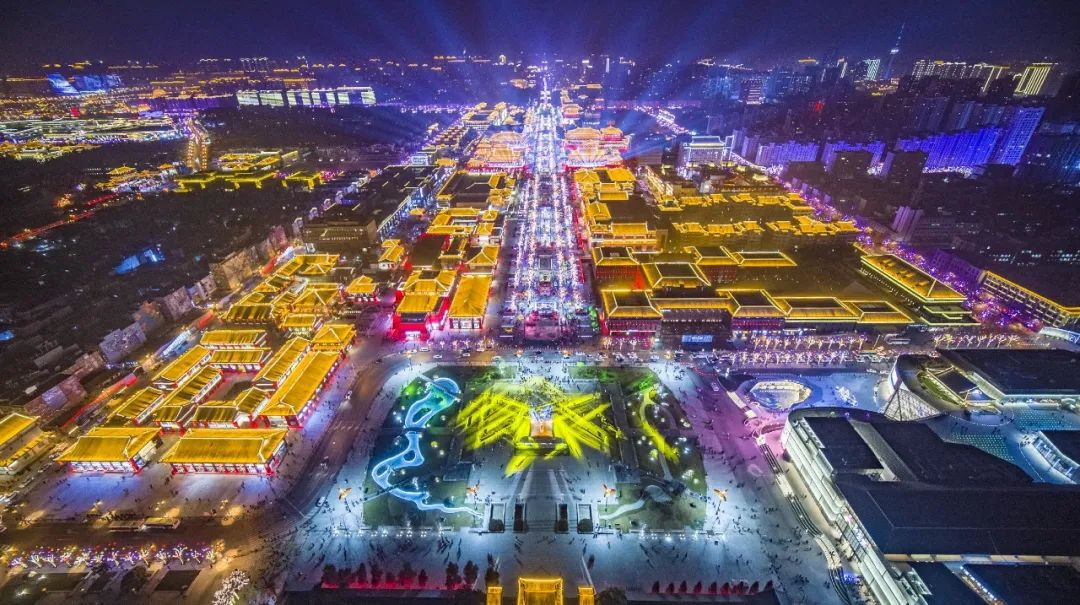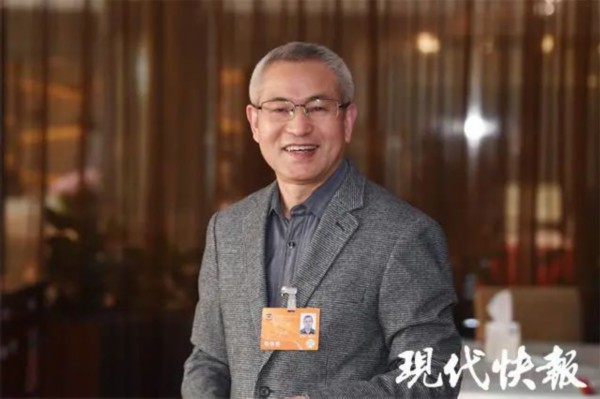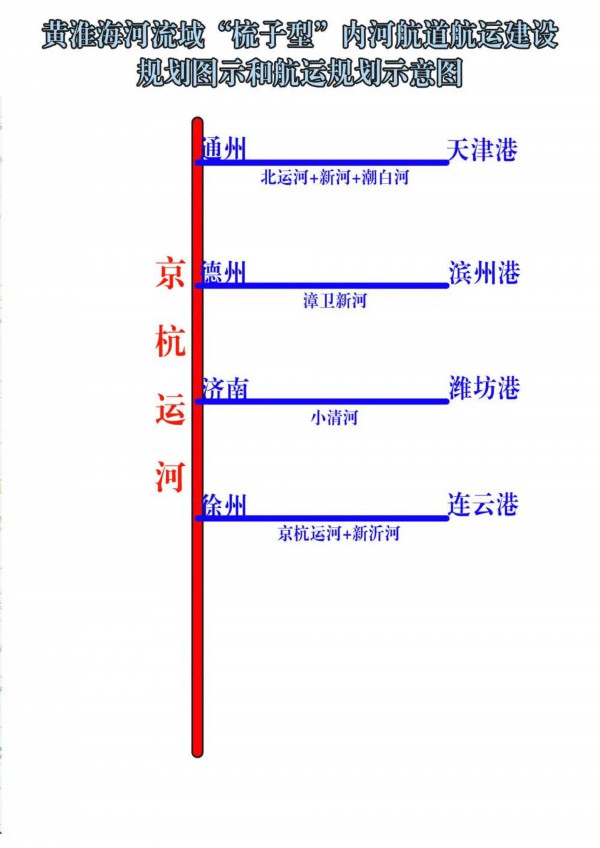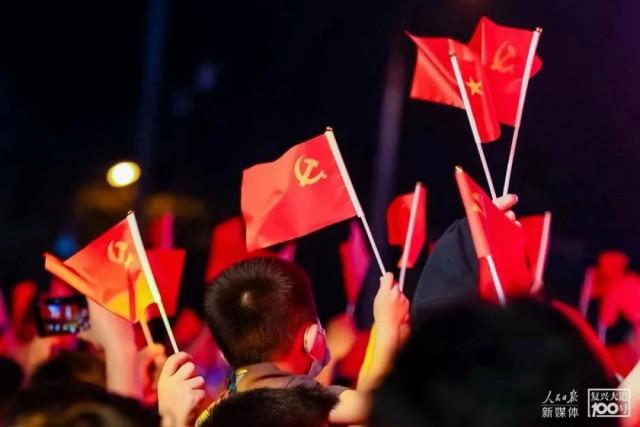
Visiting temple fairs, catching up with markets, and savoring the New Year … The seven-day Spring Festival holiday just passed has not only ignited the passion of the public to travel, but also ignited the fireworks in every town’s characteristic block, from the fashionable Sanlitun Taikooli in Beijing to the Chunxi Road in Chengdu, which is full of Sichuan flavor, from the Confucius Temple in Nanjing on the Qinhuai River to the Ciqikou in Chongqing on the Jialing River.
△ During the Spring Festival, Nanjing Confucius Temple is full of tourists.
(Source: Guangming. com)
On the eve of Spring FestivalFollowing the release of the Ministry of Culture, Tourism and Tourism, 15 companies were identified.After the announcement that the tourist resort is a new batch of national tourist resorts (please refer to our previous tweet"A big inventory of all national tourist resorts in China, it is enough to read this article! 》), againThe "public list of national tourist and leisure blocks" was issued, and it is planned to identify the ancient cultural street in Nankai District, Tianjin.Wait 57 blocks for the second place.criticizecountryleveltraveltravelleisureThe neighborhood provides a good place for tourists to experience folk culture and leisure tourism during the Spring Festival holiday.

"Tourism and leisure block" refers to a block in town with distinctive cultural theme and regional characteristics, with functions of tourism and leisure, cultural experience and public service, and integrating sightseeing, catering, entertainment, shopping, accommodation, leisure and entertainment, which can meet the needs of tourists and local residents for sightseeing and leisure.According to "Grading of Tourism and Leisure Blocks (LB/T 082-2021)", there are two grades from high to low: national and provincial.
2021In April, 2006, in accordance with the relevant planning and deployment of the 14th Five-Year Plan, the Ministry of Culture and Tourism and the National Development and Reform Commission officially started the work of establishing and identifying national tourist and leisure blocks, and in January, 2022, the first batch of 54 national tourist and leisure blocks were published (please refer to our previous tweet "The first batch of" National online celebrity Streets "was released, and one street directly brought fire to a city"). Up to now, 111 national tourist and leisure blocks have been identified in the second batch.

Overall distribution of the second batch of national tourist and leisure blocks
In recent years, with the normalization of urban stock renewal, especially the rise of consumption trends such as micro-vacation and reverse tourism in cities after the epidemic, various places rushed into the new track created by the town "online celebrity Punching Place", and a number of trendy and in-depth "online celebrity Scenes" and "online celebrity Blocks" stepped on the Internet, becoming famous on various social media platforms and becoming "Poems and Distances" sought after by countless people.
According to the Cultural Industry Review (ID: whcypl), 57 second-batch national tourist and leisure blocks newly announced by the Ministry of Culture and Tourism cover 31 provinces (autonomous regions and municipalities directly under the Central Government) and Xinjiang Construction Corps, all of which are selected from more than 360 provincial-level tourist and leisure blocks (autonomous regions and municipalities directly under the Central Government).It embodies the characteristics of key cultivation, balanced development and district-street linkage.

 Feature 1: East, West, North and South, the number is different.
Feature 1: East, West, North and South, the number is different.
According to the number of seven administrative regions (see the table below for details)East China is the leading region, with 14 articles, of which "Jiangsu and Zhejiang" provinces each have 3 articles; Secondly, there are 10 finalists in North China and Southwest China, and 2 finalists in the other 9 provinces and cities except Tibet. Northwest China and Central China ranked in the third phalanx, with 8 and 6 finalists respectively; Ranked in the fourth phalanx are South China and Northeast China, including 5 in South China and 4 in Northeast China.As far as regional volume is concerned, the number is relatively balanced. Among them, East China, North China and Southwest China have comparative advantages.
 Feature 2: the integration of districts and streets, with cities and States accounting for the bulk.
Feature 2: the integration of districts and streets, with cities and States accounting for the bulk.
From the distribution of provincial cities (see the table below for details)57 blocks cover some provincial capital cities of 31 provinces (autonomous regions and municipalities directly under the Central Government), mainly distributed in cities and counties. Among them, there are 6 municipal districts directly under the central government and 1 county under the jurisdiction of the city (Youyang County, Chongqing); There are 8 provincial capital cities, 8 municipal districts and 1 municipal county (Shilin County, Kunming City);32 sub-provincial and prefecture-level cities (states) have jurisdiction; There are 9 counties (including county-level cities) under the jurisdiction of prefecture-level cities (states).(Xiuwu County, Jiaozuo City, Fangxian County, Shiyan City, Yangshuo County, Guilin City, Litang County, Ganzi Prefecture, Danzhai County, Qiandongnan Prefecture, Jishou City, meihekou city City, Tonghua City, Dali City, Dali Prefecture and Hotan City).

 Feature 3: There are many ancient streets in the south of the Yangtze River, all along the Yun River.
Feature 3: There are many ancient streets in the south of the Yangtze River, all along the Yun River.
Everyone says that Jiangnan is good, visitors should stay in the south of the Yangtze river until old. Market wine shops, north-south shipping, small bridges and flowing water, people living in the pillow river … Every old street in Jiangnan water town has a memorable past. The Cultural Industry Review (ID: WHCYPL) found that in the 57 second-batch public list of national tourist and leisure blocks, the number of finalists in Jiangsu and Zhejiang provinces was as high as 6.It is mainly distributed in Changzhou, Suzhou, Yangzhou, Hangzhou and Huzhou on the banks of the Grand Canal, highlighting the unique historical and cultural heritage of the water towns in the south of the Yangtze River.
At the same time, the Cultural Industry Review (ID: WHCYPL) combined with the analysis of the first batch of national tourist and leisure blocks found that among the first batch of 54 blocks identified, Jiangsu and Zhejiang provinces also ranked first in the provincial administrative regions, with 3 blocks each.Among them, there are as many as four ancient streets in the cities along the Grand Canal, namely, Qingming Bridge Historical and Cultural Block in Liangxi District of Wuxi, Pingjiang Historical Block in gusu district of Suzhou, Old Bund Block in Jiangbei District of Ningbo, and Qinghefang Historical and Cultural Block in Shangcheng District of Hangzhou.

Five empowerment modes of national tourist and leisure blocks
Different from the stereotyped business model of urban traditional streets, national tourist and leisure blocks are mainly located in urban areas with rich cultural and tourism resources or characteristic blocks with profound urban history and culture, and pay more attention to the deep integration of consumption factors such as culture, tourism, commerce, leisure and entertainment, which can meet the needs of leisure and in-depth experience of different age groups. There are five common development and empowerment models.
 First, cultural empowerment, strong roots and soul casting.
First, cultural empowerment, strong roots and soul casting.
According to incomplete statistics, among the 57 tourist and leisure blocks shortlisted in the second batch, there are as many as 37 national and provincial historical and cultural blocks, local folk culture old streets and traditional cultural blocks, which occupy an absolute advantage. In the process of upgrading and reconstruction, these blocks have been unified planning and refined micro-renewal, which have preserved the original architectural style of the blocks to the maximum extent.Combined with the spatial layout, it integrates multiple fashion cultural consumption themes such as art, cultural creation, trendy shops and performances, which not only retains the cultural roots and soul of the block, but also rejuvenates the old street that has experienced historical storms.

For example, Beiguan Historic District in Bozhou, Anhui Province is the core area of Bozhou historical and cultural city, with a total area of about 1 square kilometer. There are 115 existing cultural relics (3 national key cultural relics protection units) and 15 famous relics such as Laozi, Cao Cao and Hua Tuo. In recent years,Around the elements of tourism and leisure, an intangible exhibition with the theme of "Remembering Bozhou" and performing arts, amusement and scripts with the theme of "Enjoying Bozhou" were created to kill a street.It has formed a tourism and leisure gathering area integrating museum clusters, folk experience, culture and entertainment.
△ Caocao Transport Road, Beiguan Historic District, Bozhou
(Source: Beautiful Anhui)
 The second is tourism empowerment and quality optimization.
The second is tourism empowerment and quality optimization.
From the external characteristics of the second batch of 57 blocks, the national tourist and leisure blocks are more suitable for the positioning of urban "mini" resorts and emerging tourist attractions, which not only have the functions of tourism and leisure, cultural experience and sharing between host and guest, but also integrate tourism, catering, entertainment, shopping, accommodation and other tourism and leisure formats.In the planning and design process of many tourist and leisure blocks, attention is paid to the construction standards of A-level scenic spots, and supporting service facilities such as urban subway stations, tourist service centers, parking lots and tourist toilets are built. The overall service quality and experience are better than those of traditional tourist attractions.
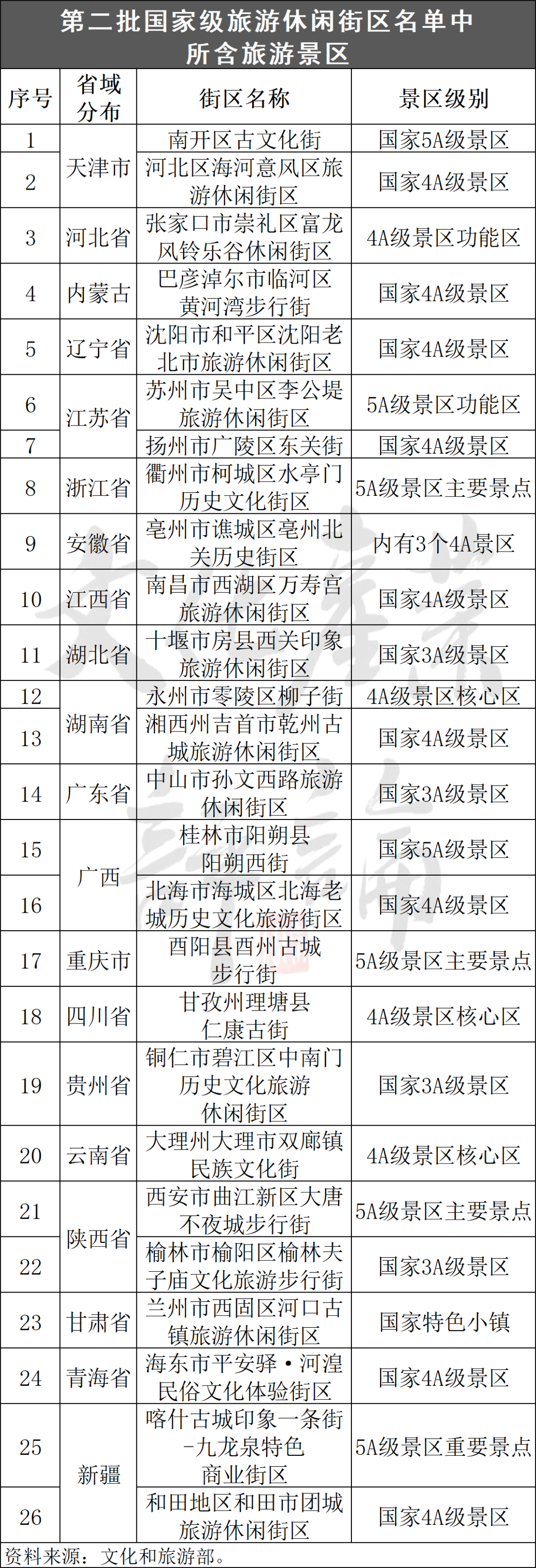
For example, the historical and cultural tourist block in Beihai Old Town, Guangxi, was built in 1821. The main street is 1.27 kilometers long and covers an area of 210,000 square meters. There are nearly 1,000 existing arcades, which is the longest and best-preserved arcade in Lingnan, China.In recent years, driven by the cultural tourism industry policy, it has developed into a well-known local leisure tourism destination, and successfully created the titles of national 4A-level tourist scenic spot, Guangxi Top Ten Night Tour Cultural District, and Guangxi Tourism and Leisure District.
△ Beihai Old Town Historical and Cultural Tourism Block
(Photo/photo by Tan Ruijun)
 The third is creative empowerment and resource activation.
The third is creative empowerment and resource activation.
According to the analysis of Cultural Industry Review (ID: WHCYPL), in the second batch of 57 state-level tourist and leisure blocks, in addition to the transformation and upgrading of historical and cultural blocks, the activation and utilization of traditional industrial heritage resources is also one of the important means for the development of tourist and leisure blocks.This kind of industrial block has the characteristics of outstanding geographical advantages, high integration of culture and tourism, strong scale agglomeration and rich available resources, which can generate certain attraction and radiation to the outside world through planning, design and creative development.Such as Beijing 751, Tangshan Qixin 1889 and Chongqing Erchang Wenchuang Street.
△ Beijing 751 Tourism and Leisure Block Power Plaza
(Source: Culture Monthly)
Take the shortlisted 1889 Wenlv Block in Qixin, Tangshan as an example. Its predecessor was Tangshan Fine Cotton Soil Factory, which was built in 1889. In 1907, it was renamed Qixin Lime Company (the first cement factory in China). After more than 120 years of wind and frost, it stopped production in 2008. In recent years, relying on the industrial remains and history and culture of Qixin Cement Plant, the local area has actively promoted the creative transformation of cultural tourist blocks, successfully created a characteristic tourist block integrating industrial tourism, industrial heritage protection, cultural creativity and leisure fashion, and was selected into the first batch of China industrial heritage protection list.
△ Tangshan Qixin 1889 Cultural Tourism Block
(Source: Voice of the North)
 The fourth is scene empowerment and immersive interaction.
The fourth is scene empowerment and immersive interaction.
It is worth noting that any form of business and cultural tourism is based on meeting the needs of specific consumer groups in specific life scenarios.The so-called scene empowerment is to conform to the psychological characteristics of cultural tourism consumption in the new era, break through the traditional single "independent experience" model, and create a strong "emotional experience" atmosphere from outdoor to indoor through means such as format matching, interactive art and three-dimensional scenes.Throughout the second batch of 57 national tourist and leisure blocks, such as Xi ‘an Datang Never Sleeping City, Tonghua Northeast Never Sleeping City, Huaxi LIVE· Wukesong, Pinganyi Hehuang Folk Culture Experience Block, etc. are typical representatives.
△ Shuidong Street, Huicheng District, Huizhou City
(Source: Southern Newspaper)
For example, Tonghua Northeast City that Never Sleeps draws on and inherits the essence of Xi ‘an Datang City that Never Sleeps. Through the innovative excavation and scene construction of the national tide culture,It has created 15+ online celebrity IP such as Meihe Taste, Qingge Wonderful Dance, Yun Ge Pipa, Yaotai Xiancao, Paper-cut Girl, Tiannv Scattered Flower, Meihe Qianqiu, Meihe Ink Dance, Lantern Impression, Mirror Heart Flower Moon, etc. It has become another "circle powder" dark horse after the city that never sleeps in Datang.According to statistics, in 2022, the northeast city that never sleeps operated for 166 days, creating a rainbow-absorbing effect that received more than 4 million tourists.
△ Meihekou Northeast Sleepless City
(Source: Jilin Daily)
 Fifth, brand empowerment and compound development.
Fifth, brand empowerment and compound development.
The Cultural Industry Review (ID: WHCYPL) found that in the second batch of 57 national-level tourist and leisure blocks, in addition to being awarded the honor of national and provincial historical and cultural blocks and characteristic cultural blocks earlier, there are still 28 blocks in recent years. In the creation of national-level cultural tourism related brands,It has been recognized as a national night cultural tourism consumption gathering area, a national cultural industry demonstration base, a national demonstration (pilot) pedestrian street, a national tourism science and technology demonstration park, etc., realizing the compound development from "one street with one product" to "one street with multiple products" and "one street with multiple creations", and the brand awareness and influence have been continuously improved.

For example, Datang City Pedestrian Street has been tepid since the first phase was completed and opened in 2009. Since it was selected as a national commercial pedestrian street promotion pilot in 2018, Qujiang New District has systematically upgraded Datang City block according to the goal of "China characteristics, local characteristics and international level", which not only created the "ceiling" of a national cultural business and travel integration block, but also was selected as the first batch of national night cultural tourism consumption gathering areas, the first batch of national demonstration pedestrian streets and the first batch of national tourism science and technology demonstrations.
△ Datang Sleepless City Pedestrian Street
(Source: Qujiang Wenlv)

tag
City fireworks, the strongest is the block. In summary, it can be seen from the inventory analysis that the newly publicized 57 second-batch national tourist and leisure blocks are given traffic labels such as "online celebrity block", "online celebrity punching place" and "new city landmark", which largely reflects people’s emotional identity and psychological belonging to urban blocks.Genus.Here, both local residents and tourists can touch the historical context of the city from the old streets and enjoy the most smoky slow life.

△ During the Spring Festival, tourists play in Nanhou Street, Sanfangqixiang, Fuzhou.
(Source: Xinhua News Agency)
During the Spring Festival this year, with the steady recovery of the consumption of cultural tourism after the epidemic, we took a micro-vacation, light tourism and socializing in the city.Under the guidance of emerging consumption such as tourism, tourist and leisure blocks are gradually changing from "punching places in online celebrity" to "urban reading" and "immersion experience", which has become one of the important carriers to promote the high-quality development of county cultural tourism economy. For example, the old northern city of Shenyang, a new national tourist and leisure block, has received more than 100 thousand visitors every day since it officially opened on the first day of the new year.


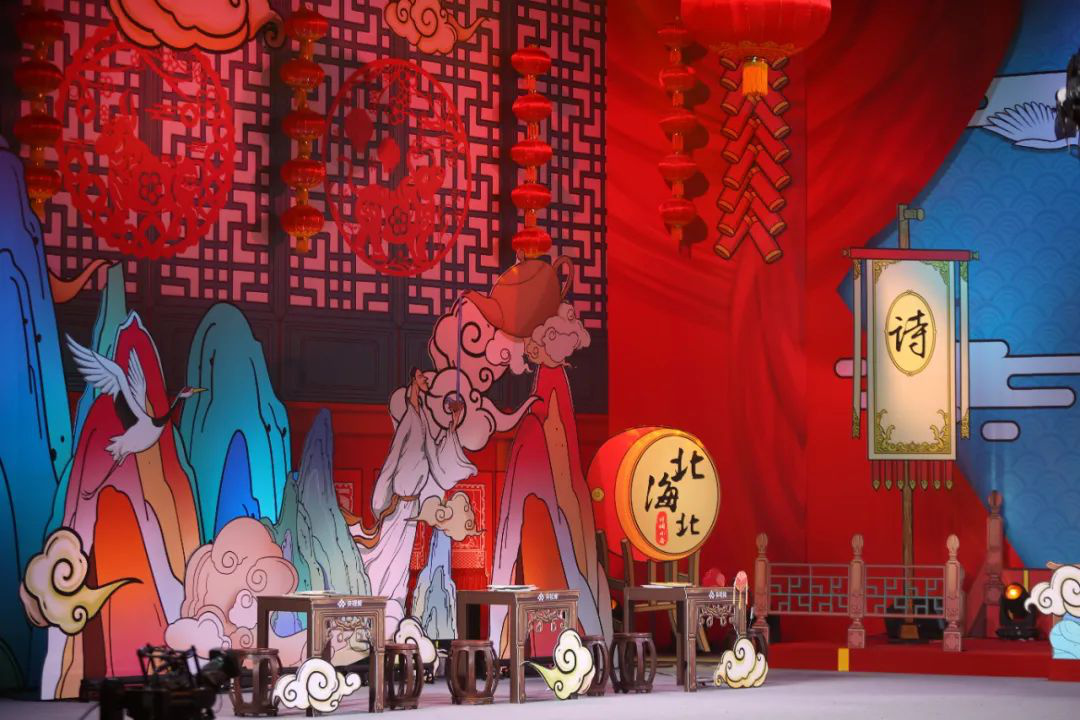
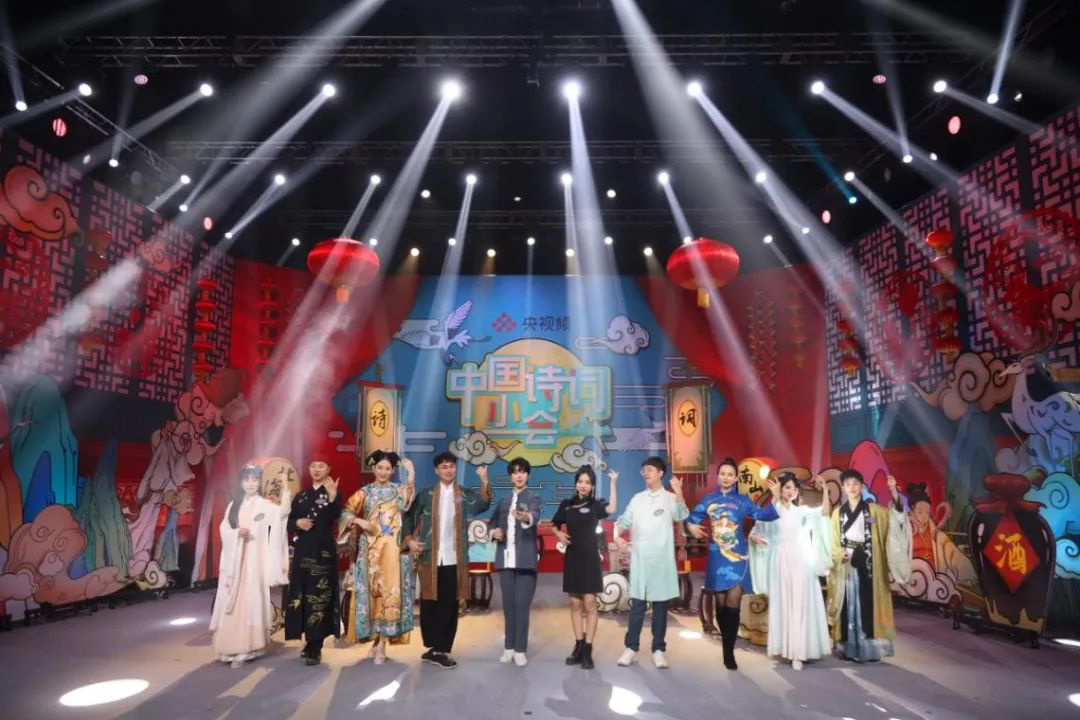












 Feature 1: East, West, North and South, the number is different.
Feature 1: East, West, North and South, the number is different.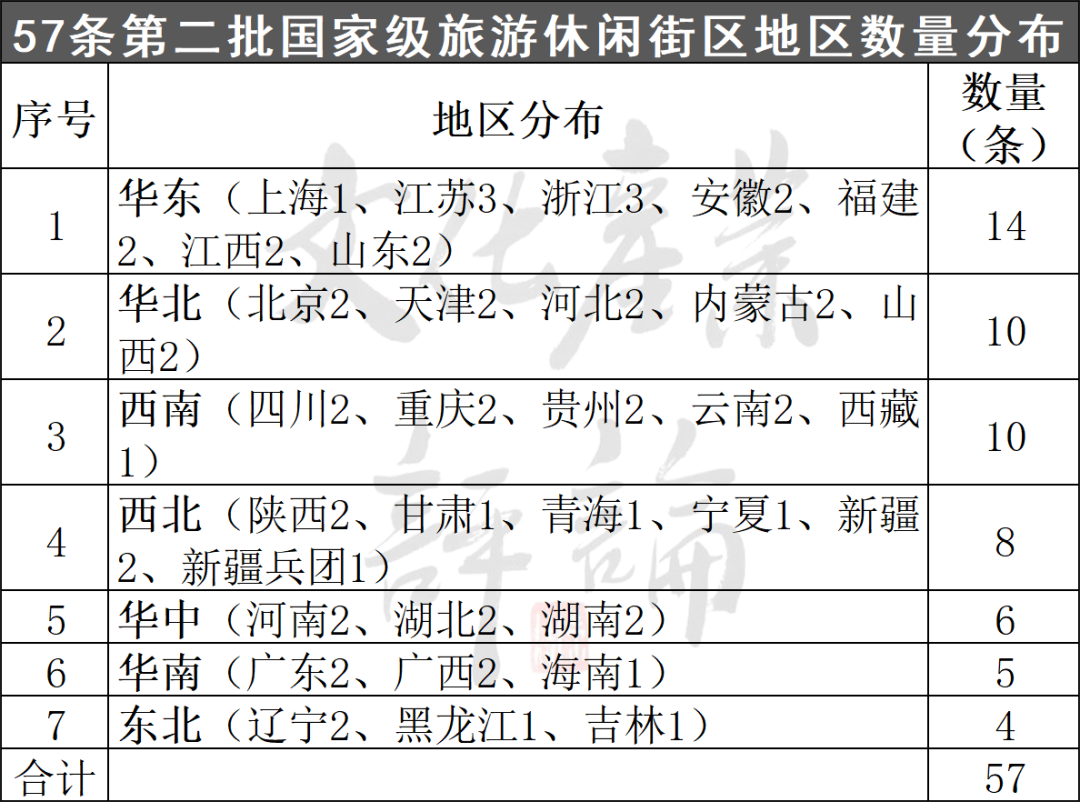
 Feature 2: the integration of districts and streets, with cities and States accounting for the bulk.
Feature 2: the integration of districts and streets, with cities and States accounting for the bulk.
 Feature 3: There are many ancient streets in the south of the Yangtze River, all along the Yun River.
Feature 3: There are many ancient streets in the south of the Yangtze River, all along the Yun River.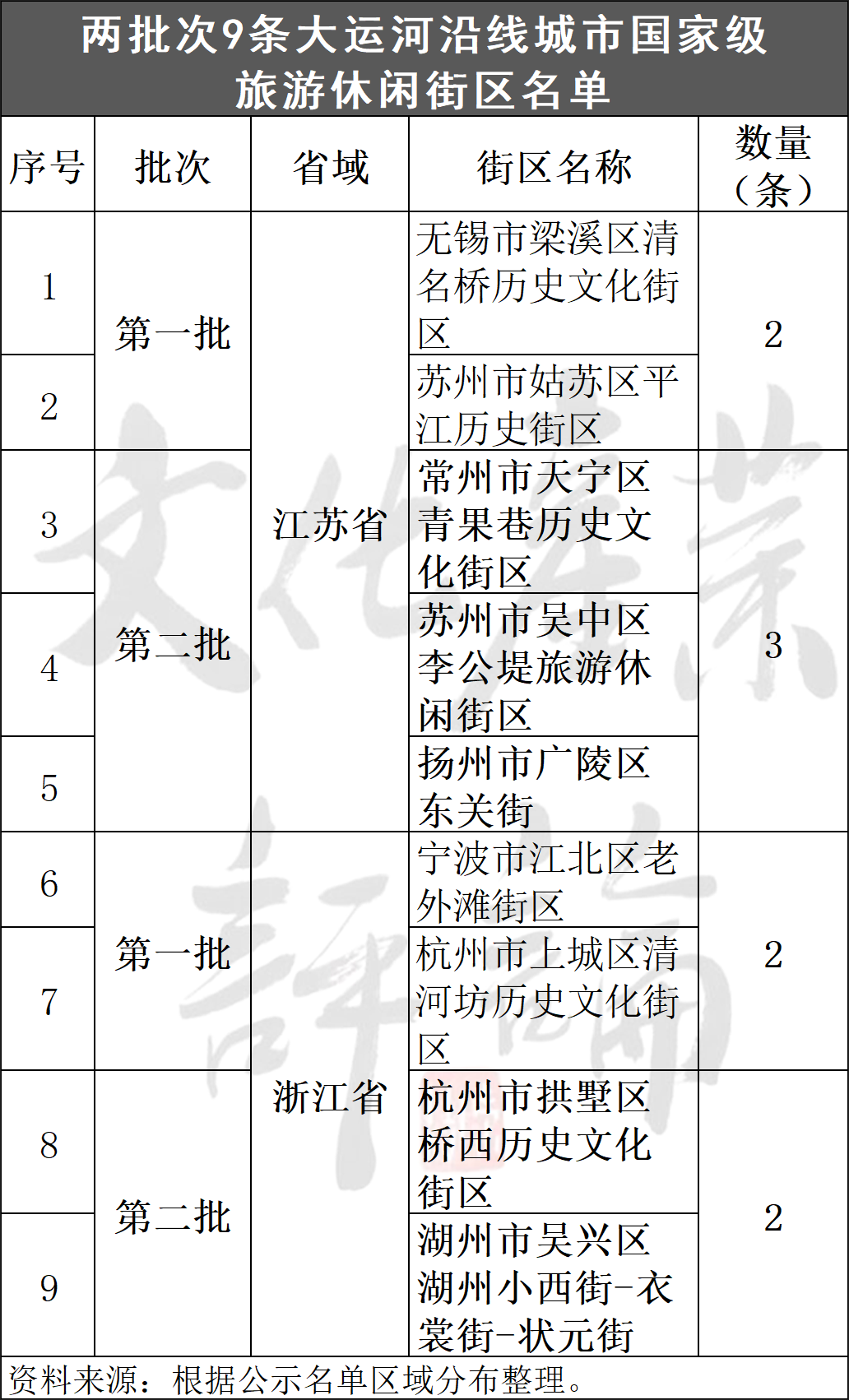

 First, cultural empowerment, strong roots and soul casting.
First, cultural empowerment, strong roots and soul casting.
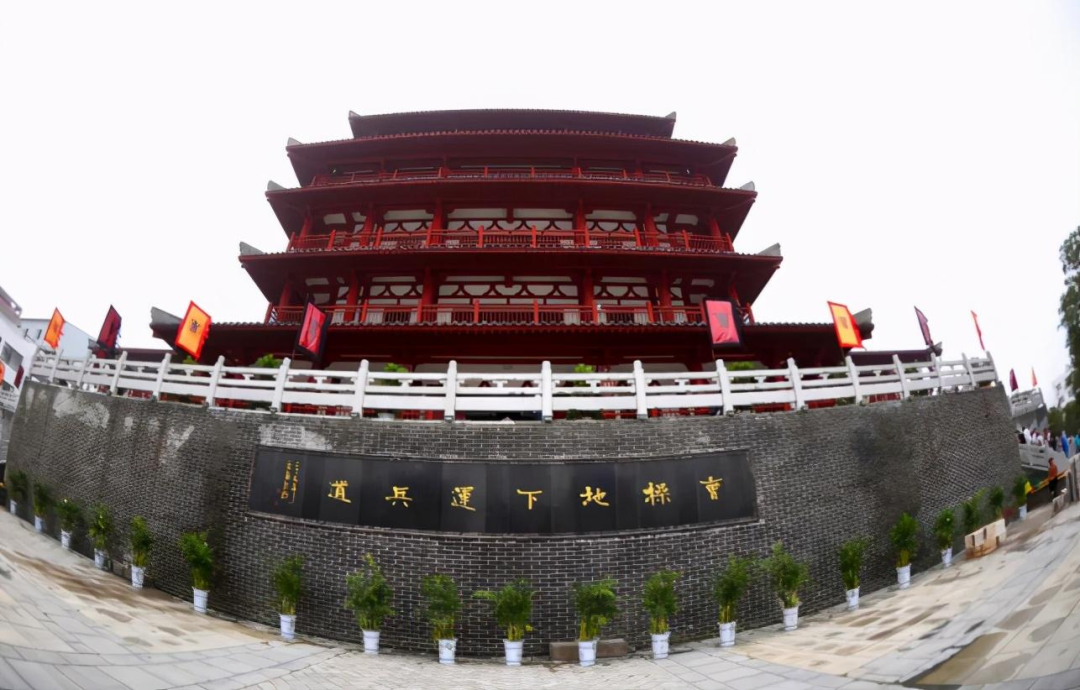
 The second is tourism empowerment and quality optimization.
The second is tourism empowerment and quality optimization.

 The third is creative empowerment and resource activation.
The third is creative empowerment and resource activation.

 The fourth is scene empowerment and immersive interaction.
The fourth is scene empowerment and immersive interaction.

 Fifth, brand empowerment and compound development.
Fifth, brand empowerment and compound development.
